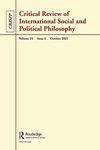Political realism and the relationship between ideal and non-ideal theory
IF 1
Q3 POLITICAL SCIENCE
Critical Review of International Social and Political Philosophy
Pub Date : 2022-09-12
DOI:10.1080/13698230.2022.2120657
引用次数: 1
Abstract
ABSTRACT When interest in political realism started to resurge a few years ago, it was not uncommon to interpret realist political theory as a form of non-ideal theorising. This reading has been subjected to extensive criticism. First, realists have argued that political realism cannot be interpreted as merely a form of applied political theory. Second, realists have explained that political realism can defend a role for unfeasible normative prescriptions in political theory. I explain that these developments, besides allowing us to reject interpretations of political realism as a form of non-ideal theory, have given us reason to think of political realism as a form of ideal theory. Yet, when ideal theory enters the picture, a series of methodological questions arise regarding the proper use of ideals. In this paper, I clarify how the relationship between ideal and non-ideal theory ought to be conceptualised in realist political theory. I examine the two major interpretations of the role of ideals that have been provided so far – the target and benchmark interpretations – and I show that neither is compatible with some of the fundamental theoretical commitments of realist political theory. This both allows me to point out the requirements that an interpretation of the relationship between ideal and non-ideal theory must meet to be defined as properly realist and allows me to emphasise the strengths of the realist approach. Accordingly, I propose a new interpretation of the role of ideals, one consistent with realist theoretical commitments: I suggest that realist political ideals ought to be interpreted as models.政治现实主义与理想与非理想理论的关系
几年前,当人们对政治现实主义的兴趣开始复苏时,将现实主义政治理论解释为一种非理想的理论化形式并不罕见。这种解读受到了广泛的批评。首先,现实主义者认为,政治现实主义不能仅仅被解释为一种实用的政治理论。其次,现实主义者解释说,政治现实主义可以为政治理论中不可行的规范性规定辩护。我解释说,这些发展,除了使我们能够拒绝将政治现实主义解释为一种非理想理论之外,还使我们有理由将政治现实主义视为一种理想理论。然而,当理想理论进入画面时,一系列关于理想的正确使用的方法论问题就出现了。本文阐明了现实主义政治理论中理想理论与非理想理论之间的关系应该如何概念化。我考察了迄今为止所提供的关于理想作用的两种主要解释——目标解释和基准解释——我表明,这两种解释都不符合现实主义政治理论的一些基本理论承诺。这既使我能够指出对理想理论和非理想理论之间关系的解释必须满足的要求,才能被定义为适当的现实主义,也使我能够强调现实主义方法的优势。因此,我对理想的作用提出了一种新的解释,一种与现实主义理论承诺相一致的解释:我认为现实主义的政治理想应该被解释为模型。
本文章由计算机程序翻译,如有差异,请以英文原文为准。
求助全文
约1分钟内获得全文
求助全文
来源期刊

Critical Review of International Social and Political Philosophy
POLITICAL SCIENCE-
CiteScore
1.60
自引率
0.00%
发文量
74
 求助内容:
求助内容: 应助结果提醒方式:
应助结果提醒方式:


